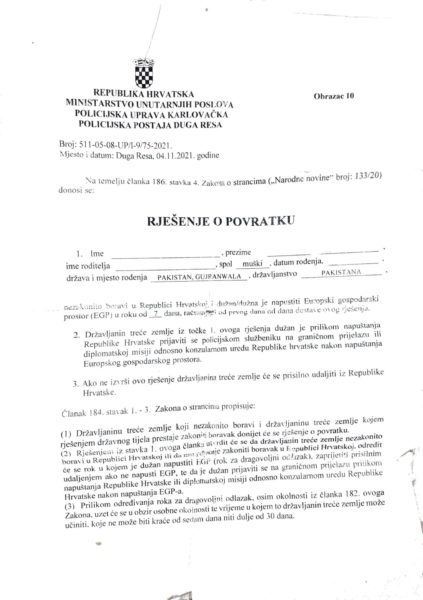The respondent is a Pakistani man who was traveling with 6 other people from Pakistan. They were all about 25 years old. They walked from Bihać to Banja Luka and crossed the border on foot on November 1st. After entering Croatia, they walked along E70 for 3 days.
Six uniformed men stopped them on the evening of November 4th. According to the respondent, the uniforms they were wearing seemed dark blue, -which would be consistent with the ones of the border police-, though the darkness made it hard to identify them very clearly. The Pakistani men were reportedly frisked and loaded on a police van, in order to be taken to a police station. The interviewee remembers the drive as very difficult: it was very hot inside the vehicle and the driver was driving so recklessly that most of them threw up. For this reason, he cannot recall how long it took them to arrive at the police station.
I have a question to the EU: “Why are the police treating us like this? Why do they beat us and think we are not human?”
The respondent claims that it was all very dark, and he could not see what the station looked like. Moreover, he describes they were not allowed to leave the one room where they were all locked in. They were reportedly not given any food or water and they did not have the possibility to go to the toilet, though one of them was feeling very ill. According to the respondent, they were checked again by the police, who confiscated the food in their backpacks and all their other belongings: money, cellphones, power banks.
Afterwards, the officers reportedly told the group that if they pointed out who was the “smuggler”, who “knew the way”, they would give them some “special paper”. The interviewee claims that this paper was then given to 3 men, including the respondent, whereas the rest of the group was told they would be deported. The officers did not explain the content of the paper, but a translation in Urdu was stapled to the Croatian one. Nevertheless, the respondent describes that he was -and still is- unsure about the meaning of the document, whether it would allow him to stay and move through Croatia or on the contrary, it would force him to leave the country.
In fact, the paper states that the respondent has 7 days to leave the country and register at any border exit point. Also, it states that the detained people could actually leave the station and circle in the municipality where they were caught. By the header of the document, the location of the detention can be detected as well: the police station of Duga Resa, in the municipality of Karlovac.
Because the respondent did not understand the nature of the document, he chose to go back to Bosnia together with the men who were not given the same paper. He had an injured leg, too, and was afraid to move through the country without any money, thus with no possibility of buying any bus ticket. According to the respondent, because of the lack of clarity, he assumed the document would grant him the possibility of re-entering Croatia at a later time. He describes that when he asked the officers for explanations, his doubts were not cleared at all. In fact, the whole group was reportedly pushed back.
Thus, in the same night, the police drove them back to Bosnia-Herzegovina and left them in the proximity of Sturlić.

